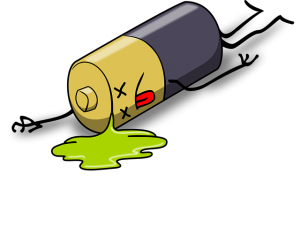Attention Span Of a Housefly

 Advertisers are especially sensitive to the number of seconds available to interrupt and grab the attention of the target audience. If the pitch connects in the first SEVEN seconds, the prospect will notice some aspect of message. The battle to control interruptions is real!
Advertisers are especially sensitive to the number of seconds available to interrupt and grab the attention of the target audience. If the pitch connects in the first SEVEN seconds, the prospect will notice some aspect of message. The battle to control interruptions is real!
Most of us are shocked to admit that we, too, fall prey to unwanted breaks that create a comparable attention span to that housefly.
Why are we not bothered by this?
I propose that we do not control interruptions because we believe most come from external sources and that we have little control over the cause of interruptions.
Instead of accepting this premise, I have come to believe that the real source of my distractions in life can be brought back to many sources that are within my direct control.
CONTROL INTERRUPTIONS
I noticed the extreme quiet in the days following my high-tech job. My thoughts were complete and left me wondering what would happen if I explored each one. There was no rush to write down a few notes before running off to some meeting that was most likely a waste of my time.
 Those thoughts could linger over a couple of days and allow me to revisit various facets at my own pace. I could remember the details that I had investigated yesterday, even without notes. My mind was relaxing and asking for more fodder to exercise and stretch.
Those thoughts could linger over a couple of days and allow me to revisit various facets at my own pace. I could remember the details that I had investigated yesterday, even without notes. My mind was relaxing and asking for more fodder to exercise and stretch.
At night, my mind would race because there were no problems to solve. I didn’t have to fight for the chance to embrace the most recent challenge and have the time to play out various scenarios before the next crisis came through the door. In those quiet hours, thoughts rarely turned into fears because there was no urgency.
Conversations took on more meaning because of the ability to concentrate without the ringing phone, never ending meetings and emails and the choices before me.
Why had I allowed everything in this world to invade my mental world
where the best I had to offer was set aside for the external demands?
Then, the truth began to emerge from the fog of burnout. I was literally too tired to sustain my concentration.
As I got some much-needed rest, I reflected on the most important moments, where a break in the flow of thought would change the course of:
🗫 a great story that someone was telling me when my mind would drift to some other commitment. No wonder I never really felt connected to other people. Each one had to compete with my own thoughts that would burst onto the scene in the form of an interruption.
🗫 an important conversation would devolve when I allowed my attention to leap from the person speaking to the one out in the hall. I had the choice of where to focus. The individual never had a chance to connect with me as a person because my mind was elsewhere.
🗫 problem solving was supposed to be fun. Every issue had become a distraction from the most recent crisis that could have been avoided. I had always loved collaborating with others to devise great solutions. Maybe we weren’t brilliant, but we could come up with great ideas when we stayed in the problem to the very end.
🗫 the sales process was unfruitful because I would interrupt my own prospect just before the depth of his pain came out with tears of frustration. Each conversation left me wondering what I was doing wrong.
In each of these situations, I had to realize that my short attention span was getting shorter because I looked for any excuse to bail out of the situation that was too difficult.
I was the source of my own interruptions that were dragging me further down the road to burnout. The inability to recognize my fatigue was accelerating the effects on my work and home life.
Allowing every possible interruption was only part of the real issue.
WHEN I INTERRUPT MYSELF . . .
As I listen to any sort of live conversation or instruction, I notice a trend. The speaker will interject a phrase that breaks the train of thought.
When did this start, and why is this pattern acceptable?
 My favorite instructor has started to spend more time interrupting herself than actually teaching the material. Focus on the material would eliminate the feeling that there is too much to share in a very short time period.
My favorite instructor has started to spend more time interrupting herself than actually teaching the material. Focus on the material would eliminate the feeling that there is too much to share in a very short time period.
In another situation, the speaker was spending too much time telling us why we had to be okay with his word choice. If the words distract, the audience will leave, and that is exactly what I did.
Once I evaluated my own approach, I realized that I interrupt myself in writing, conversation and instruction.
Now this situation is getting serious because clear communication is one of my most valued traits.
Adopting the techniques I hear could not continue. I had to put a stop to saying extra words in the middle of a sentence or making mistakes in my writing because . . .
. . . The quality of communication declines and the other person never has a chance to understand my message.
🗫 IN WRITING – mistakes interrupt my reader’s train of thought that was supposed to arrive at a similar conclusion where my true meaning is waiting.
🗫 IN TEACHING – when I interject a fleeting thought, my student misses my entire point.
🗫 IN CONVERSATION – the extra phrase in the middle of a sentence breaks my listener’s concentration.
Each instance prevents that billionth of a volt from creating the meaningful connection required for breakthrough. If I really want the other person to grasp my message, my top priority must be to eliminate the distractions that interrupt the very thought I am fostering.
If my communication is going to connect, all those fleeting thoughts must be captured for later without creating an interruption now. As soon as I recognize the break in my audience’s attention, I must make an effort to regain that train of thought for both of us.

Even more of my interruptions are directly within my control. Just because the ‘interrupt myself’ practice is common does not mean that I can continue to create interruptions that reduce the effectiveness of my efforts to communicate with others.
AFTER THE INTERRUPTION
I once heard that a stop along the road of a long journey can cost the traveler 30 minutes.
Does this apply to the interruptions that I experience throughout my day?
If I was focused on a book or a task with a deadline,
would I lose a half hour just because of an interruption?
That thought has made me pause and evaluate the number of ways that my attention is pulled away from the most important responsibilities in my work and life.

The energy required to recover from an interruption is exhausting.
🗫 in READING — the text changes perspective and my mind is jolted off the train of thought so re-reading the page is required.
🗫 in CONVERSATION – the subject changes without warning and answers to questions are required to understand.
🗫 in LISTENING – the speaker inserts unexpected phrases that distract from the flow and meaning so my mind wanders for 5 minutes.
“It takes 25 minutes to recover from a phone call or an e-mail,
researchers have found, and yet the average person receives
such an interruption every 11 minutes.
Which means that we’re never caught up;
we’re always out of breath, running behind.”
~ Pico Iyer
Every interruption causes fatigue.
At times, the answer is to stop what I am doing and refocus elsewhere.
How much less elapsed time would be required to cover my responsibilities
if I just sustained my focus long enough to finish each task?
Would the quality of my work rise because I had decided
that 30 minutes of focus is worth two hours of casual effort?
Now I want to know the answer to that.
My commitment is to spend the next 100 days focused on each task with all my energy until I am finished, and refusing to pay attention to the fleeting thoughts that cross my mind.

Wonder what is next?
Stay tuned for the reports of my 100 Day Quest to Stop Interruptions!
A CHALLENGE TO CONTROL INTERRUPTIONS!
Today, notice the interruptions that sap your strength and decide for yourself if blocking those distractions wouldn’t be beneficial!




